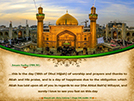2. The Economic Equality
- Details
- Hits: 3765
2. The Economic Equality
To bring about this equality in the economic condition of the people, Islam has introduced various methods. An important method is the transferring of the excess wealth from the fortunate sector of the society to its less fortunate members. This is done on two different levels: on an individual level and on a collective level.
On Individual Level:
Economic equality is pursued through the moral and ethical teachings of charity. In Arabic, this is known as sadaqa and infÄq. There are many verses in the Qur'Än which command the Muslims to help others voluntarily. There are more verses dealing with voluntary charity than the obligatory dues. Every one is morally obliged to help others according to his or her own means and resources.
First level of charity:
They ask you (O Muhammad) as to what they should spend (in way of charity). Say, “Whatever can be spared (from your wealth after your own expenses).” (2:219)
Second level of charity:
...The pious (are) those who...spend (in charity) from whatever We have given to them. (2:3)
Third level of charity:
The pious people (are) those who spend (benevolently) in good and bad days. (3:134)
In all these levels, one must remember to follow the path of moderation:
neither keep your hand shackled to your neck (out of greed), nor outspread it completely open—otherwise you will sit reproached and denuded. (17:29)
Someone asked Imam Ja`far as-SÄdiq about a group of people who are prosperous while their Muslim brothers are in severe need. Is it right for the rich people to eat and drink satisfactorily while their brothers are hungry, especially during the difficult days? The Imam said, “Surely a Muslim is brother of a Muslim; he does not oppress his brother, neither abandons him nor deprives him. The Muslims are obliged to work hard for their brother, to relate to him, to help him, and to be charitable towards the needy people.”[31]
On Collective Level:
Economic equality is guaranteed through the obligatory taxes on the excess wealth of every Muslim. In an ideal Islamic society, the Islamic government is responsible for enforcing the laws of Islamic taxes like khums, zakÄt, fitrah, khirÄj, etc. For example, while explaining the role of an Imam in his capacity as a leader, Imam Musa al-KÄdhim says, “The Imam is the heir of a person who has no heir, and he is the provider of a person who has no provider.”[32]
This economic security is to be extended to all the subjects of an Islamic state, even if they are non-Muslims. Once Imam ‘Ali passed by an old man who was begging on the side of the road. The Imam asked, “What is this?” The people said, “O AmÄ«ru 'l-mu'minÄ«n, he is a Christian.” The Imam said, “You have used him until he became old and is unable (to work any longer), and then you have deprived him (of his basic needs)!! Provide for him from the public treasury.”[33]
In short, Islam aims at eliminating the “need” (hÄjat), and elevating the needy people to the level of being “free from want” (ghani).
* * *
This lesson is entirely based on
Khums: An Islamic Tax (Third Edition, 1992) of Sayyid M. Rizvi











